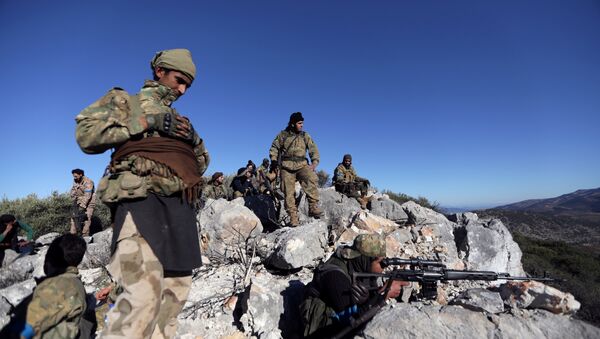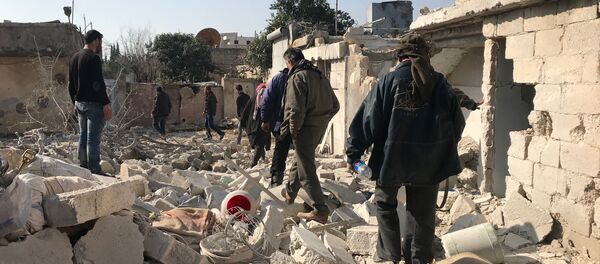On January 20, Turkey announced the beginning of Operation Olive Branch against the Kurdish forces in Syria's northwestern Afrin district. Ankara considers the Democratic Union Party (PYD), a Kurdish political party in northern Syria, and Kurdish People's Protection Units (YPG) militia affiliates of the Turkish Kurdistan Workers’ Party (PKK), listed as a terrorist organization by Ankara. Damascus has expressed its opposition to the Turkish operation, saying that such actions violated Syrian sovereignty.
Spirit of Resistance
Speaking about the Turkish operation, Garib Huso, co-chair of the public relations committee of the so-called Democratic Federation of Northern Syria, stressed that the district was demonstrating a high level of resistance.
"Despite the power and military equipment that Turkey has, it is already 40 days that the Kurds and YPG do not give up, continue fighting and do not let the Turkish forces to advance to the center. Afrin is now demonstrating a great resistance. Yugoslavia could withstand only several days against NATO. Same military equipment is now being used against the Kurds in Afrin," Huso said.
According to a Sputnik's source in Kurdish security, over 180 civilians have fallen victims of Turkey’s military operation in Afrin, while over 550 have been injured.
"For Turkey, Afrin is just a small village. Still, it couldn't complete its operation until now… The spirit of resistance in Afrin now is similar to what it was in Kobane," he stated.
Huso and his family are Yazidis. They live in Afrin and are considered by both Daesh (terrorist group, outlawed in Russia) and Turkey "unbelievers." He fears for his family and laments that the society where various ethnicities and confessions used to co-exist in peace is now on the verge of falling apart.
"Before this attack, all nationalities and confessions lived peacefully together in Afrin. Once destroyed, a building can be restored, but the society cannot. Nothing remains for us but to fight and to resist until the end. We have no choice, even if we have to confront such a powerful NATO member," Huso said.
Speaking as a representative of Yazidi Kurdish religious minority, which combines elements of Zoroastrianism, Islam, and Christianity, he said that they feared of persecution and forced conversion to Islam by the Turkish forces, adding that many Yazidis around Afrin had already left their villages.
FOREIGN FLAGS AROUND CITY
Turkey has repeatedly claimed that it is fighting against terrorism in Syria, and is doing so as part of the anti-Daesh coalition and NATO. The military alliance called on Ankara to refrain from the disproportionate use of force during its activities in northern Syria, however, raised no direct objections to it.
Damascus, meanwhile, called Turkish actions an "assault," an "occupation" and an "aggression," stressing that the presence of other states' military forces on Syrian territory without its approval contradicts to the international law and should be dealt with correspondingly.
"Turkey is acting in coordination with terrorist groups, everyone knows this. They joined forces and are attacking and occupying the Syrian territories. Now one can see Turkish flags around Afrin, in Syria. This is occupation," Huso emphasized.
In this context, the Kurds in Afrin had expectations of Russia as a power which might be able to influence the Turkish actions in the region.
"Russia is the only country that could exert pressure on Turkey and stop it. Why isn't it doing it? If Afrin falls, what benefit will Russia have from it? These groups will not stop. If Afrin falls, they will reach Damascus. We are not against the diplomatic relations between Russia and Turkey and other countries. But our people should not become victims of such relations," Huso said.
READ MORE: Israel Needs More Reasoned Decision-Making After Attacks in Syria
Earlier in February, Russian Deputy Foreign Minister Mikhail Bogdanov said that Moscow was ready to be an intermediary in the resolution of the situation in Syria's Afrin, but it was not forcing the offer to mediate on anyone.
Hashim Haji, a resident of Iraq's Sinjar and member of the local Mejlis (representative body), also noted that "it is only Russia that can exert influence on Turkey, as Russia is not a NATO member."
New Phase of Battle Ahead
While foreign states preferred to stay aside from the unfolding situation in Afrin, it turned out to be precisely the case when the Syrian government forces and the Kurds found themselves in the same boat.
"Those forces of the Syrian government who came to Afrin to help the Kurds are not official, they are just popular forces who came to help under the deal between the Kurds and Damascus. They fight together to protect the Syrian territory. They have victims as well," Huso said.
However, there might be a new phase of the battle ahead.
On Monday, Turkish Deputy Prime Minister Bekir Bozdag said that Ankara was deploying special military and police forces to Afrin to "complete successfully the operation and protection of civilians."
"Turkey is constantly sending new reinforcement and special forces to Afrin, they collect people from various regions. They want to create a new Osman Empire," Huso said.
READ MORE: Erdogan Must Go: As Kurds Turn to Damascus, Turkey's Op Loses Relevance
Nevertheless, residents of Afrin are not running away. They are even joined by "civilians from Iraq's Sinjar, which also came under attack in 2014, who are now willing to help Afrin, feeling one nation and moving there to help resistance," Ahtan Ali, co-chair of the Yezidi Democratic Party from Sinjar, told Sputnik.
According to Huso, people in Afrin have nowhere to flee, and their only options are to hide and fight until the end.



